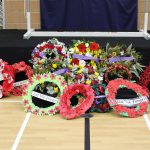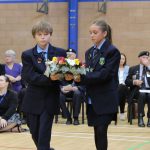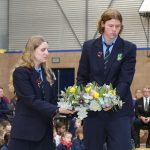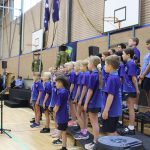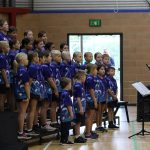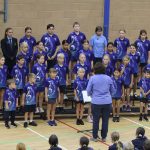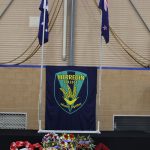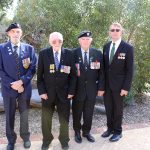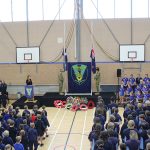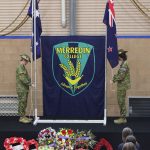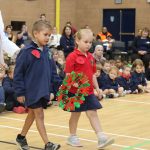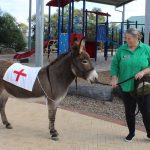ANZAC Commemorative Service
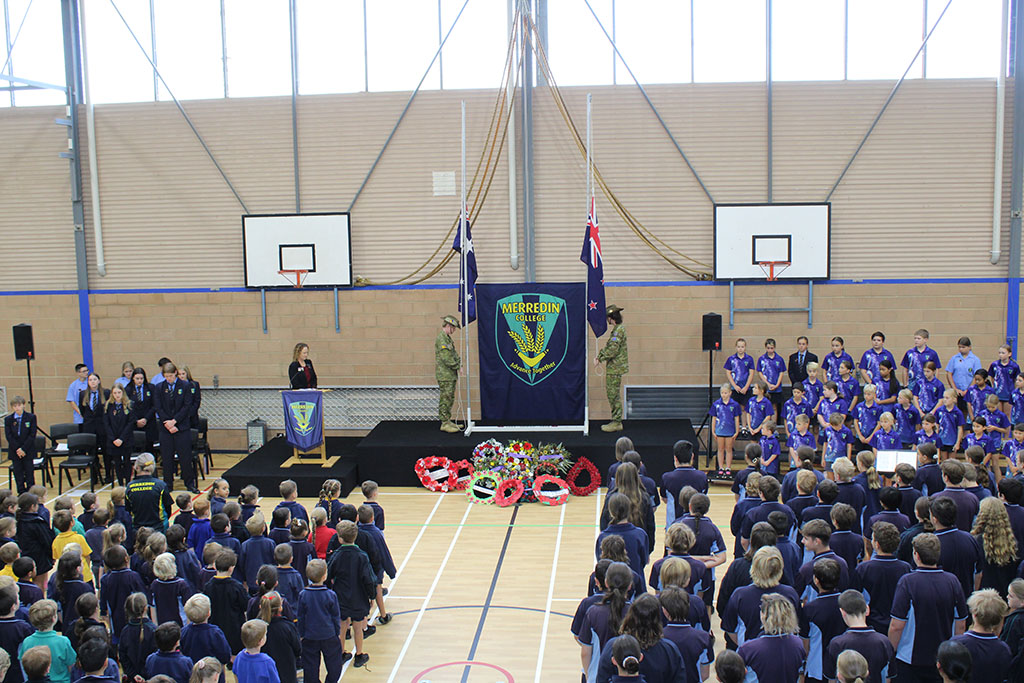
On the final day of Term One, Merredin College held its annual ANZAC Commemoration service.
Each primary class created and laid their own wreath for the special ceremony. Our very talented school choir sang, led by Mrs Caryn Adamson and Cadets Liam Fox and Sean Martin did a very professional job of the flags.
Year 10 students recited odes they created throughout the term, dedicated to aspects of war. In particular below is a special tribute written by Year 10 student Leo Jovanovich about a local Veteran Mr Eddie Johnston whom we are very honoured to have had in attendance at our school services for many years now.
Students and staff acknowledge the service of our veterans and sincerely thank them for their attendance at our ANZAC assembly.
‘Mr Edward Johnston’ – by Leo Jovanovich
It was my great honour to interview Mr Edward Johnston and I feel privileged to share my report with you today. Mr Johnston joins us today as our honoured guest today.
Edward Johnston is a son of the first ANZACS. Edward was born in 1923 in Perth, Western Australia. His father fought in World War 1 against the Germans. Whilst fighting he was shot but luckily his diary, notebook and a metal clip on his sunglasses case, which he was carrying in his breast pocket saved him. If it wasn’t for these small items that saved Ernest Clive Johnston’s life, Edward Johnston would not be here today.
Edward grew up in Perth and went to Wesley College, South Perth. He was a Champion Boy in running and finished school in late 1939. When Edward was 18 years old he moved to Northam, Western Australia where he started work in a bank but Edward’s ordinary life would soon change.
On the 19th February at 9:58am 1942, it was announced that the Japanese bombed the top coast of Darwin dropping bombs in two separate attacks, killing 252 allied servicemen and civilians. The Japanese went on to bomb many cities, towns and harbours in Northern Australia. In total there were 111 attacks and bombings on Australian soil by the Imperial Japanese Airforce, killing many and destroying many ships and buildings.
Australia, knowing what was coming, prepared to send off young men to fight the Japanese. Thousands of soldiers went to the Kokoda Track campaign and New Guinea campaign. This contingent of young Australians included Edward Johnston and this is where his story starts.
Edward was only 18 when he enlisted to go and defend his country. By the time he had finished basic training he was 19 and ready to leave. First Edward arrived in Perth from Northam saying his farewells to his mother and family. His mother, scared for her son, sent him off and so Edward went to New Guinea.
Edward arrived in the hot climate of New Guinea carrying a backpack with basic tin foods, biscuits, a tin hat, a 303 rifle, extra clothes and his personal belongings. He was assigned to the Signals Corp and was given the position of supplies and communications. Edward is a smart person and perfect for conducting an important job like this one. He was stationed with 250 members of the Australian Army, all living, sleeping and eating together, so he got to know them pretty well and had made some great friends. The food described by Edward was simple and it got boring after a bit of time. Occasionally to change up their meals.
Edward and his fellow soldiers used grenades to catch fresh fish to bring back to camp.
Many men, including half of the camp’s 250 members commonly got sick with malaria but thankfully they were okay with some being sent back to Australia to be treated and others sent back because of injuries. Edward did not sustain any injuries physically or mentally himself but soldiers from other camps did and many even lost their lives. He described the Japanese as not showing sympathy or mercy to their enemies. They were harsh and cruel to prisoners that they captured. Edward spent three years in New Guinea from 1942 to returning in August 1945, the result of an Australian allied victory and the ending of World War 2.
So what can we all take away from Edward’s time defending Australia? I would like to use Edward Johnston’s words, “War is a horrible thing and we should avoid wars. There are still wars going on today and many people lose their lives, you won’t achieve much and wars are simply a waste of time.”
Lest we forget all the soldiers, men and women who gave their lives for the country of Australia and a special thanks to Edward Johnston for sharing his story with us and happy 100 years.

